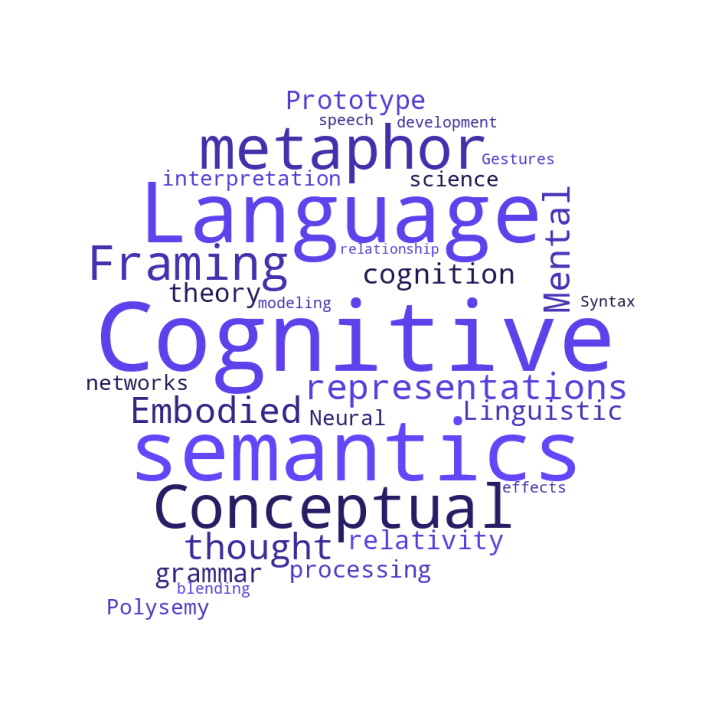One of the most modern areas of linguistic research is cognitive linguistics. Is this a “young” science?
Cognitive linguistics is one of the most modern areas of linguistic research in the world. The birth of cognitive linguistics was officially proclaimed in 1989 in Duisburg at a symposium organized by Rene Dirven and other European scientists. The symposium agreed to form the International Cognitive Linguistics Association, to start publication of the journal Cognitive Linguistics and a series of monographs Cognitive Linguistics Research. In the first issue of Cognitive Linguistics, the journal editor-in-chief Dirk Geeraerts declared that the objective of the new branch of linguistics was to study language as a means of organizing, processing, and transmitting information.
What is cognitive linguistics? What is its purpose?
Defining cognitive linguistics, one could say that it is a science that deals with cognition in its linguistic representation. Cognition is the basic concept of cognitive science; it means both the cognitive process itself and the results of this process - knowledge. It is any conscious or unconscious process associated with obtaining information or knowledge, aiming at its evaluation, transfer, memorization, retrieval from memory, use, and construction. When we talk about cognition, we mean that the world is represented in our minds in the form of certain structures of knowledge, opinions, and assessment of the world. The goal of cognitive linguistics is to get deeper insight into the forms of these structures through the comprehension of language and describe the dependencies that exist between these structures and language. To pursue this goal, linguistic units are to be considered in the aspect of how they represent principles of conceptualization and categorization of the world, as well as ways of interpreting the entire cognitive experience of an individual or a language community.
What do cognitive linguists study?
Cognitive linguists study language capacity in its ontogenesis, mental lexicon as a system that ensures information processing, text comprehension and information extraction from texts, discourse and discursive practices organization. Within the framework of domestic and foreign cognitive linguistics, the following areas of research press forward: cognitive semantics, cognitive lexicology, and cognitive grammar. Cognitive studies of language are interdisciplinary in nature, which is determined by the goals and objectives they face.
What achievements of cognitive linguistics are the most important?
If we summarize everything that cognitive linguists have done to date, the most important thing concerns a new understanding of language as a special cognitive capacity. It was this understanding that ensured the development of new methods and techniques of analysis, the achievement of noteworthy theoretical and empirical results, as well as awareness that language is significant in knowledge representation and interpretation and an individual is key in all spheres of linguistic activity.
The scientific school of Derzhavin University “Cognitive Linguistics. Interaction of Mental and Linguistic Structures” is known to be the leading one in Russia. What are its achievements?
The scientific school of Derzhavin University “Cognitive Linguistics. Interaction of Mental and Linguistic Structures" was founded in 1997. Its leader is Nikolai Boldyrev, Doctor of Philology, Professor, Honored Scientist of the Russian Federation. The main achievements of the school include:
- a typology of linguistic formats of knowledge: conceptually simple and conceptually complex;
- a typology of cognitive and linguistic structures and mechanisms of their interaction;
- a description of an individual’s linguistic consciousness and principles of its organization: subjective and dominant;
- a description of secondary phenomena in the linguistic worldview and their cognitive foundations;
- a theory of linguistic interpretation the main assumption of which is that cognition and language use are highly interpretive processes;
- a cognitive theory of linguistic anthropocentricity based on studying the interpretive function of language and its realization at different levels of the system of language, in discursive practices and translation;
- a cognitive theory of language as a universal theory of how knowledge operates in language; and
- innovative research methods including those devised to analyze conceptually complex linguistic formats of knowledge.
What is the scientific school team currently working on?
Today, the team of scientists is working on a new topical project to study the interaction of mental and linguistic structures. The project is called “Cognitive foundations of conflict-free language communication.” It received support from the Russian Science Foundation. It should be noted that the team of the scientific school has extensive experience in conducting research on projects supported by various scientific foundations and organizations.
Is there a printed body at Derzhavin University where cognitive linguists can publish the results of their scientific research?
Together with the Russian Cognitive Linguists Association and the Institute of Linguistics of the Russian Academy of Sciences, Derzhavin University publishes the journal Issues of Cognitive Linguistics (indexed in Scopus and RSCI) and the series Cognitive Studies of Language (indexed in RSCI).
On a regular basis, Derzhavin University hosts international and nation-wide conferences and congresses on cognitive linguistics.
How are students involved in conducting research in cognitive linguistics?
Students of Derzhavin University attend meetings of scientific student associations (clubs) on cognitive linguistics, conduct research on cognitive linguistics as part of coursework and final qualification papers, and report on their results at conferences and seminars held by Derzhavin University and other Russian academic institutions. Students have the opportunity to use the unique funds of the Network Scientific and Educational Center for Cognitive Research, operating at the university. The most talented students pursue postgraduate and doctoral studies and defend their theses in cognitive linguistics at the Dissertation Council for Philological Sciences at Derzhavin University.
